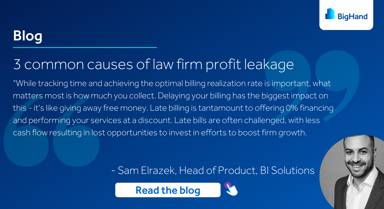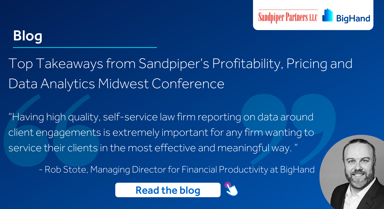In recent years, the global economy has weathered a storm of uncertainty, from the impact of the COVID-19 pandemic to economic fluctuations and rising inflation. Amidst these challenging times, law firms have found themselves in an increasingly cost-conscious position. Clients now more than ever, demand greater financial transparency and look for efficiency in their legal expenditures. As the legal sector adjusts to these evolving dynamics, firms are looking to diversify their fee structures and explore innovative pricing models such as Alternative Fee Arrangements (AFA’s) that not only appeal to clients but also set them apart from the competition.
Within law firms, there is an ever-increasing focus on profitability rather than just high revenue; both through delivering work at an appropriate rate as well as reviewing internal operations to become more efficient. For entities seeking legal services, there is a greater focus on being cost conscious and cognisant of how much they are spending on their legal fees. In BigHand’s latest industry report, 52% of firms confirm clients want more financial transparency. Alongside these factors and the less desirable nature of the billable hour model to clients, firms are having to diversify how they price and offer their services.
Advantages of Portfolio Pricing
Instead of the traditional billable hour model, one way in which we see firms diversifying their fee structures to provide a more attractive pricing model for clients, as well as distinguish themselves from the competition, is through portfolio pricing. A “portfolio” is typically a series of matters bundled together with a fixed fee arrangement on the bundle. This could be all the work for a client during a given period or all the work required to deliver a specific transaction. Pricing legal services in this manner provides greater transparency of the expected fees for both firm and client, as well as allowing for the option of creating dedicated teams for the portfolios of work. In my experience working with law firms, this can help build strong client relationships, leading to potential referrals and the likelihood of the client coming back for more services in the future due to high client satisfaction.
Although pricing as a portfolio or using other Alternative Fee Arrangements provides a sense of predictable revenue, work must be planned, budgeted & subsequently delivered on the individual matters is monitored to ensure the arrangement remains profitable. A realistic fixed fee must be set on the arrangement at the outset by analysing the required work on previous similar engagements. Once set, firms need to still plan and budget for the work for the individual matters to compare the combined budgeted total against the fixed fee portfolio arrangement. This is important not just to compare the material fee vs the fixed fee, but also to get a sense of the cost of delivery of the matter.
We know that 47% of firms say clients now want clearly defined matter budgets, indicating the importance of not only defining and agreeing on the matter remit up front, but also effectively managing the process throughout a matter. As matters progress, it’s important to keep an eye on how the actuals track against the budget. This is both at the overall portfolio level & individual matter level to identify if the arrangement is no longer profitable as more matters may become involved than what was initially envisaged. We’ve seen 46% of firms report demand for even more client reporting, showing there is an underlying shift in attitude among clients toward micro-managing their law firm relationships. By using data to initially set the price, budget, and track the matters within the portfolio, we can streamline the process to ensure a profitable arrangement, and in cases where issues are occurring within the portfolio, provides the visibility to discuss an increase on the price due to these issues.
Matter Pricing Tools Empower Profitability
Combining the insights gathered from our latest global report with our experience with a global network of law firms, we have enhanced our Matter Pricing application by adding functionality to cater to the portfolio model. This feature allows you to easily group matters of work together, price and track them either as a group or see how they are performing individually. This, combined with the matter level reporting and notification functionality, can help drive client communication, leading to a better client relationship and the likelihood of agreeing to an increase in price in the event of the scope increasing.
Cloud Based Technology Compliments Hybrid Work
Law firms are reevaluating their internal operating processes to thrive in the era of flexible working, where hybrid work is the preferred approach. The use of cloud technology facilitates connectivity across different workstyles in the post-pandemic world. By utilising the cloud, users can access the most up-to-date software with automatic updates, alleviating the burden on IT to manually maintain an on-premise solution.
Our research suggests 36% of firms plan to adopt a cloud-based budgeting tool within the next 12 to 24 months. This trend highlights the recognition of cloud-based technology among firms and the advantages it offers.
By being able to offer AFAs and having strong business processes as well as cloud technology to aid in recording and reviewing the offering, firms can better differentiate themselves from most of the market to drive business and profitability, helping to ensure they can better sail through these times of economic turbulence.
Matter Pricing is now available both in the cloud and on-premise, giving users the flexibility to access the tool from anywhere at anytime. This accessibility ensures frequent access to the latest features and updates, enhancing user experience and efficiency.
Learn more about how BigHand can support your firm’s pricing models and protect your profitability by scheduling a demo.






